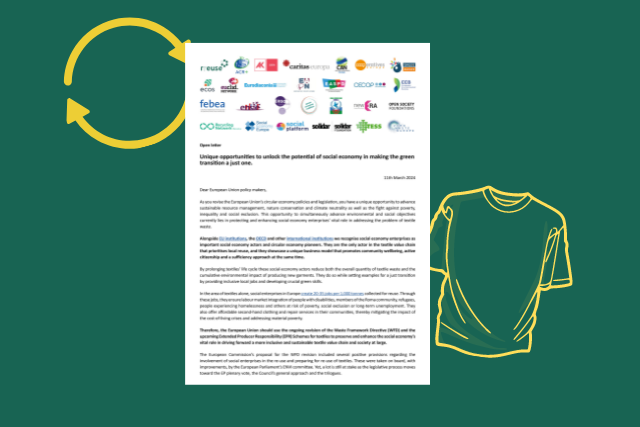Major social and environmental organisations call for the Waste Framework Directive to ensure a central role for the social economy

Brussels, 11 March 2024 – Leaders of more than 80 international networks and NGOs, as well as national organisations from 18 European countries, have written to the EU policymakers to demand support for social economy enterprises in circular economy policies. Focusing on the urgent issue of textile waste, RREUSE and co-signatories of the just-released open letter call for the ongoing Waste Framework Directive revision to unlock the potential of social economy in making the green transition a just one.
“We recognize social economy enterprises as important social economy actors and circular economy pioneers. They are the only actor in the textile value chain that prioritises local reuse, and they showcase a unique business model that promotes community wellbeing, active citizenship and a sufficiency approach at the same time,” write the letter signatories. We point out that social enterprises in Europe create 20-35 jobs per 1,000 tonnes of textiles collected for reuse and that “Strengthening the role of social economy in textile reuse and waste management is an environmental imperative as well as a catalyst for inclusive economic and social development.”
The letter calls for the EU policymakers to uphold all positive provisions on the social enterprises’ role in the collection and management of used and waste textiles that the European Commission included in its proposal for a WFD revision. The co-signatories ask for social enterprises, alongside municipalities, to have decision-making power in the Extended Producer Responsibility schemes’ governance. We also call for Extended Producer Responsibility fees to cover all costs associated with reuse and preparing for reuse activities carried out by social enterprises, including the management of residual waste, and for social enterprises to maintain ownership over the used and waste textiles they collect.
Beside major social economy networks the open letter was endorsed by environmentally and climate-focused actors such as the Climate Action Network (CAN), European Environmental Bureau (EEB), Zero Waste Europe, the Environmental Coalition on Standards (ECOS), the Association of Cities and Regions for Sustainable Resource Management (ACR+) and the Green Economy Coalition; as well the European Federation of Ethical and Alternative Banks and Financiers (FEBEA); and NGOs and networks focused on social justice such as the Social Platform, SOLIDAR, European Anti-Poverty Network, the European Roma Grassroots Organisations (ERGO) Network, the European Association of Service Providers for Persons with Disabilities, Caritas and Eurodiaconia.
Notes:
- Textile waste is an embodiment of the overproduction and overconsumption issues driving resource depletion and broader environmental destruction. The European Commission’s Joint Research Centre points out that EU consumers discard 5.8 million tonnes of textiles every year. According to the European Environmental Agency, each person in the EU consumed on average 14.8 kg of textiles in 2020, and around 4-9% of all textile products put on the European market are destroyed without ever even being used for their intended purpose. This is the consumption area with the third highest impact on water and land use, and the fifth highest in terms of raw material use and greenhouse gas emissions.
- Earlier this year RREUSE, the initiator of the open letter, put forward Guiding principles for policymaking on textile collection and management to ensure that the sector can live up to its potential in delivering a just green transition.

